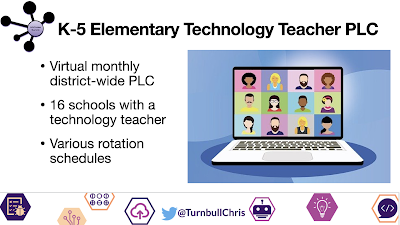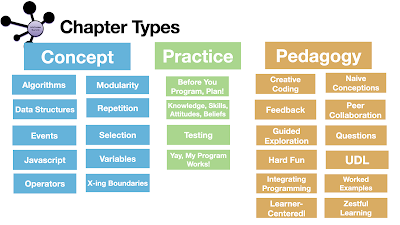Are you interested in learning more about computer science instruction in K-12 classrooms and how unplugged lessons can deepen students' understanding of abstract terms and concepts?
Saint Paul Schools elementary technology teachers have been deepening their own computer science knowledge and sharing concrete unplugged lessons and activities to take back to their classes through a monthly virtual PLC book study this school year.
Find out what book they are reading together, which topics they prioritized to read about first, and top unplugged activities that they are using with their students to build computer science and computational thinking skills.
Presentation Slides
District-wide Elementary Technology Teacher PLC
Since there is usually only one technology teacher in an elementary school in my district, they can choose to participate in an optional district-wide PLC that meets after school for two hours every month with other technology teachers rather than being in a PLC at their school with homeroom teachers or other specialists. Being in the district-wide PLC allows for lesson sharing, anecdotal lesson data comparison, and exploration of new ideas and resources.
We decided to continue meeting virtually this school year to eliminate travel time and rush for those teaching at late-ending schools. Each school's principal and leadership team decides which grade levels technology teachers will teach and how long each rotation with a grade level will last before switching to another specialist.
Book Study
This year we were able to do a book study as part of our PLC. We decided to read the book Computer Science in K-12: An A to Z Handbook on Teaching Programming by Shuchi Grover to deepen our computer science knowledge and align instruction across schools. The book provides a nice balance of research and practical classroom suggestions.
Chapter Topics
The chapters in Computer Science in K-12: An A-Z Handbook on Teaching Programming are organized alphabetically by computer science topics. The chapter topics range from algorithms to integrating programming in other subjects to JavaScript to variables and much more.
Chapter Types/Categories
The chapter types or categories fall into three distinct groups. Computer science concepts or technical terms, practices or strategies that students might use, and pedagogy or how to teach computer science.
Book Study Reading Overview
Since the chapters are organized by alphabetical topics, they do not need to be read in sequence, which allows for them to be re-organized and read in any order. Although initially we started reading the book chapters in sequential order, we soon prioritized some of the chapters to ensure that we were able to re-read them before the end of this school year.
Focus Chapters Related To District Work
Some of the chapters were also closely aligned with other work that we're doing in my district. The "Integrating Programming in School Subjects" chapter connects with work that we are doing to integrate computer science in the elementary homeroom classes to reinforce content learning and in other subject classes in middle school and high school. The "Learner-Centered and Culturally Relevant Pedagogy" chapter also focused on similar information to the book Culturally Responsive Teaching and the Brain by Zarreta Hammond, which all teachers in our district read this year through book studies at each school.
Unplugged Lesson Resources
The "Guided Exploration Through Unplugged Activities" chapter of the book suggested using unplugged lessons that can be done to introduce abstract computer science topics through practical, concrete activities in the form of familiar games or common everyday activities. After completing the activity, it is important to link the unplugged activity back to the abstract concept or technical term to ensure student understanding of the concept.
Some great resources for finding free unplugged lesson activities include Code.org, CS Unplugged, Barefoot Computing, and the popular Which One Doesn't Belong website wodb.ca which includes thought-provoking puzzles that help to develop computational thinking skills.
MNCodes Summit Session Challenge
If you would like to participate in a fun, mini challenge for the summit, use your favorite app on your computer, phone, or mobile device to create a graphic calling out a letter of the alphabet and the corresponding computer science term or concept. Include the letter of the alphabet, the computer science term, and a related image or definition of the concept. Then post your image on Twitter with the hashtags #MNCodes, #A2ZK12CS, and @TurnbullChris.











No comments:
Post a Comment